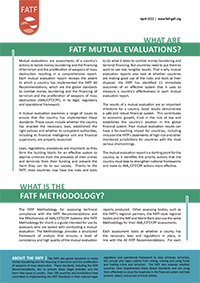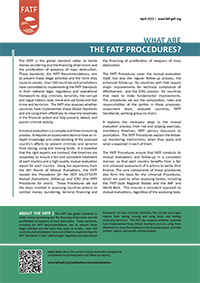This landmark gives a comprehensive overview of the state of global efforts to tackle money laundering, terrorist and proliferation financing.
The report is based on data from FATF and FSRB mutual evaluation reports since 2013, which assessed the strengths and weaknesses of national frameworks to tackle these crimes.
Overall, the report finds that countries have made huge progress in improving technical compliance by establishing and enacting a broad range of laws and regulations to better tackle money laundering, terrorist and proliferation financing. This has created a firm legislative basis for national authorities to ‘follow the money’ that fuels crime and terrorism.
In terms of laws and regulations, 76% of countries have now satisfactorily implemented the FATF’s 40 Recommendations. This is a significant improvement in technical compliance, which stood at just 36% in 2012, demonstrating the positive impact of the FATF Mutual Evaluation and Follow-up processes.
However, the report also highlights that many countries still face substantial challenges in taking effective action in line with the risks they face. This includes difficulties in investigating and prosecuting high-profile cross-border cases and preventing anonymous shell companies and trusts being used for illicit purposes.
This report informed the FATF’s Strategic Review, which aims to make the next cycle of FATF assessments more timely, risk-based and effective. FATF took stock of the results of the current round of mutual evaluations (the 4th Round) and used this information to make a number of changes to how the FATF will assess countries’ actions in the 5th Round.
Some of the changes to the 5th round of assessments will include:
- a significantly shorter mutual evaluation cycle, so that countries get assessed more frequently
- greater emphasis on the major risks and context to ensure that countries focus on the areas where the risks are highest and
- a results-orientated follow-up assessment process, which will focus on specific actions to tackle money laundering, terrorist financing and the financing of weapons of mass destruction.
See for more information, the documents below. These documents are not yet in effect. The ‘FATF Methodology’ and ‘FATF Procedures’ will come into effect when the FATF commences the 5th Round of mutual evaluations and may be subject to change before the start of that next round.






 Twitter
Twitter
 Facebook
Facebook
 Instagram
Instagram
 Linkedin
Linkedin
